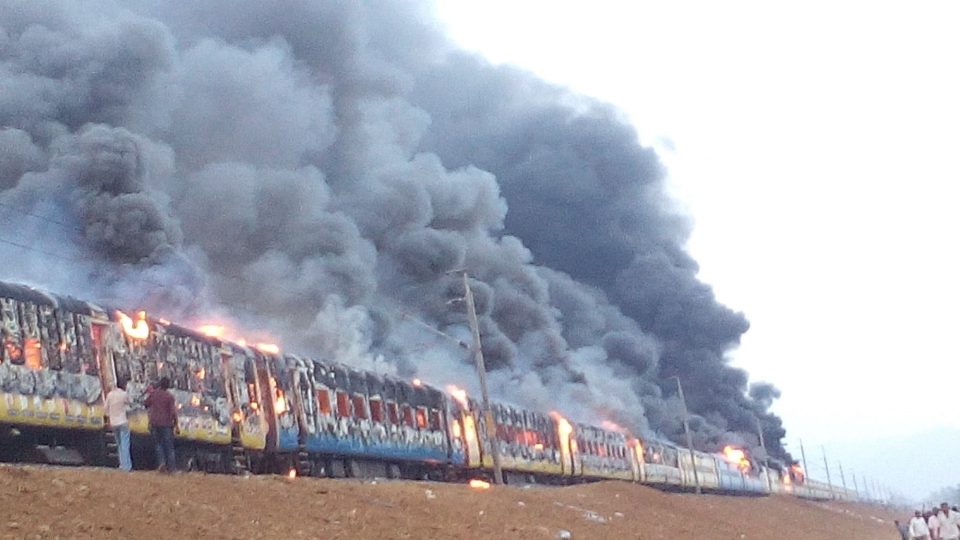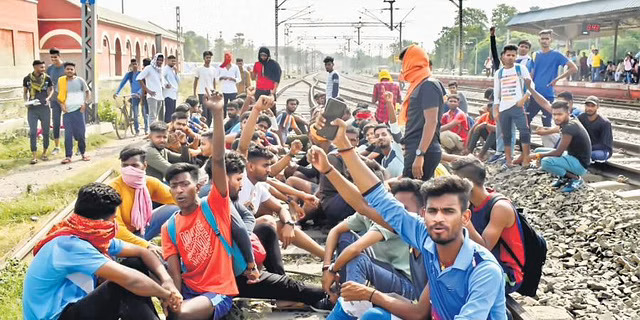
Agnipath rampage could hurt Modi govt more than farm laws

The Agnipath scheme has handed a splintered Opposition another plank to regroup and launch a united onslaught against the Centre. The scheme for short-term recruitment in the Armed Forces triggered widespread protests soon after it was announced earlier this week.
Despite the Centre tweaking the scheme on Thursday (June 16) evening to extend the age limit for recruitment to 23 years instead of the earlier stipulated 21 years, the anti-Agnipath stir intensified on Friday.
Large-scale arson, torching of train coaches and violent demonstrations were witnessed in several states by angry youth who have reportedly been preparing for enrolment in the Armed Forces but now feel short-changed by the Agnipath scheme.
Our Live Coverage of Agniapth protests
Demands to scrap the scheme or at least take it back to the drawing board for wider consultation with defence experts and stakeholders have come in thick and fast from Opposition parties such as the Congress, Samajwadi Party, Bahujan Samaj Party, Trinamool Congress, Rashtriya Janata Dal and even the BJP’s own slippery ally, Nitish Kumar’s Janata Dal (United).
Opposition parties believe that containing the protests and expected electoral backlash against the scheme has come as the next big challenge for the Narendra Modi regime seven months after it was forced to roll back three contentious farm laws that had led peasants from Punjab, Haryana and parts of Uttar Pradesh to lay siege on Delhi’s borders for 15 long months.
It’s still too early to pre-empt the political damage this series of protests could have on the BJP. Yet, a section of Opposition parties feels the electoral damage to the BJP from ignoring, or worse, discrediting the agitators may be far more than what the party was predicted to face from the farmers’ agitation before Modi announced the repeal of the farm laws ahead of crucial assembly polls to Punjab, UP, Uttarakhand, Goa and Manipur.

The farmers’ agitation was largely peaceful, drew its foot soldiers from a handful of states and the siege of Delhi gave an impression that the agitation hadn’t seeped into the hinterland. In contrast, protests against Agnipath spread like wildfire across several states, including Bihar, Uttar Pradesh, Madhya Pradesh and Himachal Pradesh, where the BJP is in power or part of the ruling coalition. Even in South, it had its ripples: in states like Telangana, the protests turned violent, which led to the death of a protestor.
The current protests, though seemingly as organic as those against the farm laws, do not seem to be orchestrated by any particular organisation or union. The protests against Agnipath draw their ranks from among the youth – mostly from rural areas and mostly Hindus; a bloc the BJP had worked assiduously and successfully on to build into a formidable vote bank. Unrest among this section of the electorate, thus, robs the BJP of its usual ploy of ‘othering’ the dissenters and branding them as anti-nationals – as was done with the farmers, more particularly the Sikh peasantry that emerged as the face of the agitation and got branded as Khalistanis in return.
Conversely, the Agnipath scheme also gives the Opposition a chance to punch holes in Modi’s self-aggrandizing pitch of being a true patriot who will never compromise the nation’s interests since one of the principal criticisms of the short-term recruitment scheme is that it compromises the Armed Forces and so, by extension, India’s security interests.
Sharply critical of the scheme, Congress leader P Chidambaram had said on June 16 that Agnipath “makes a mockery of training; inducts into the defence forces an ill-trained and ill-motivated soldier; and discharges a disappointed and unhappy ex-soldier into the society”.
The former Union home minister had then urged the government “to keep the Agnipath scheme in abeyance, hold wide consultations with serving and retired officers, and address the issues of quality, efficiency and economy without compromising on any of the three considerations”.
A day later, though Congress MP Manish Tewari broke ranks with his colleagues to praise Agnipath as a “much-needed reform”, the party escalated its attacks against the Centre. Congress’s Rajya Sabha member Deepender Hooda asserted during a party briefing that the scheme “should be taken back immediately” as it is “neither in favour of our national security, nor it is in favour of the future security of our youngsters, nor it is in national interest”.
Hooda also drew a politically loaded parallel between the protests against Agnipath and the two previous agitations that had erupted over the Modi government’s legislative misadventures – the farmers’ agitation of 2020-2021 and the land acquisition stir of 2015. Hooda said that the Modi regime’s initial attitude towards the previous agitations as well as the one against Agnipath point to a “huge disconnect between rural India and the current government… on both those occasions, the farm laws and land acquisition, they brought in policies which were not in resonance with rural India, they were rejected and they had to take their steps back. This (the anti-Agnipath stir) is the third occasion that proves they (the government) don’t hold in high esteem, the ambition of rural India”.
Congress MP KC Venugopal, a member of the Parliamentary Standing Committee on Defence, has now written to Jual Oram, the chairman of the panel, to “convene an urgent meeting of the Standing Committee on Defence at the earliest to discuss and deliberate upon the Agnipath scheme in detail.” Venugopal has also urged Oram to invite to the panel’s meeting “all major stakeholders and defence experts for their opinion and input”.
Other Opposition outfits have aired similar demands and criticisms. RJD chief Lalu Yadav, as well as Samajwadi Party chief Akhilesh Yadav, have both asked the Centre to “immediately withdraw” Agnipath, with the latter calling the scheme a “betrayal of true patriotic youth of the country” and “a gamble with the future of this country and its people”. Bahujan Samaj Party chief Mayawati, too, has asked the Centre to “reconsider” the scheme.
The Trinamool Congress issued a statement demanding withdrawal of the scheme. “There are others, retired military commanders, who know the military establishment inside out, who are flabbergasted at this scatterbrained scheme. They have warned that, on the one hand, Agnipath will weaken the military establishment, and on the other, endanger society at large when Agniveers are let loose on the streets, unemployed and without pension”, the Trinamool said.
While the Opposition’s criticism or that from the BJP’s own in-house critic, Lok Sabha MP Varun Gandhi, was expected, what’s possibly more troublesome for the saffron party is the reaction of Nitish Kumar’s JD-U.
- Agnipath scheme: What Agniveers can expect after four years
- Agnipath scheme decoded: How to join, salary, benefits — and criticism
Ties between the BJP and JD-U, partners in Bihar’s ruling coalition, have been rocky for quite some time. What has triggered fresh political intrigue in Bihar’s political corridors is that the violent protests against Agnipath in the country began from the state, with Kumar showing no urgency or inclination towards quelling them. Instead, Kumar’s confidant and JDU’s chief Rajiv Ranjan Singh ‘Lalan’ has demanded that the Centre “immediately reconsider” Agnipath as it has ignited in the youth a “sense of dissatisfaction, despair and a fear of a bleak future”.
Lalan’s statement comes at a time when political observers in the state are predicting a possible realignment in the state’s crowded electoral space. Kumar has been warming up to Lalu Yadav and the RJD chief’s son, Tejashwi Yadav, in recent months while his aides have been routinely engaging in a bitter war of words with allies from the BJP.
The recently concluded Rajya Sabha polls saw Kumar refusing to re-nominate his former confidant and Union minister RCP Singh as a candidate for the biennial election, jeopardising Singh’s future in the Union cabinet. The reason for Kumar benching Singh, say JD-U insiders, was the Union minister’s growing proximity to the BJP, particularly Union home minister Amit Shah.
Sources in both JDU and the RJD claim that even if Kumar doesn’t sever ties with the BJP in the coming months, he is preparing grounds to do so and could also put the BJP in a fix by refusing to support the NDA’s candidate for the Presidential Polls due in July. Kumar’s refusal to come to the BJP’s defence on the Agnipath scheme is being seen by his party colleagues and potential allies in the RJD as a part of the changing political dynamics of Bihar.
Cornered, the BJP insists that the anti-Agnipath protests are being triggered by the Opposition that is spreading misinformation about the scheme and misguiding protestors to gain political mileage. It’s a familiar strategy from the BJP’s political playbook; put into motion each time a decision by the Centre evokes strong criticism from the public.
However, the fact that the Centre had to tweak the scheme within three days of its announcement also shows that the BJP sees a potential electoral threat in the protests that are now raging across the country. The evident damage control measure has only emboldened the Opposition to be more vociferous in demanding that the scheme be scrapped.
With Parliament’s monsoon session due to begin a month from now and sundry Opposition party’s scrambling once again to present a united front, with discussions underway on fielding a consensus candidate against the BJP’s nominee for the July 18 Presidential Polls, the steadily growing backlash against Agnipath has come at a bad time for Modi and his government.
Will Modi buckle, once again, as he did last November 19 when he suddenly announced his decision to repeal the farm laws, or will his hubris prevent him from inflicting another blow to his scrupulously built image of a ‘strong Prime Minister’?


